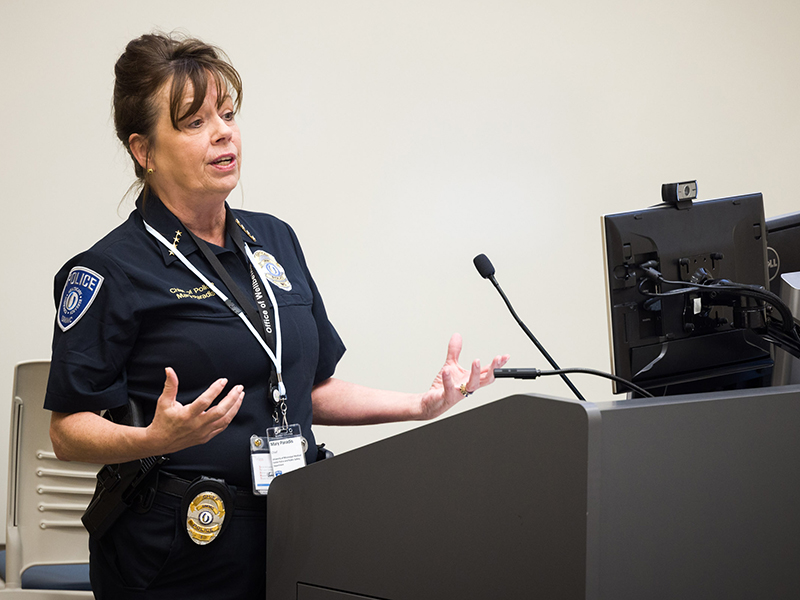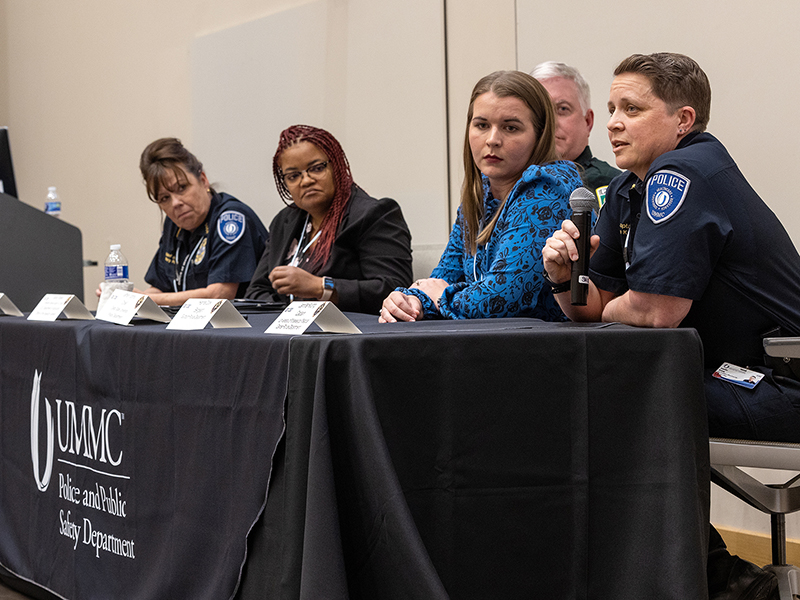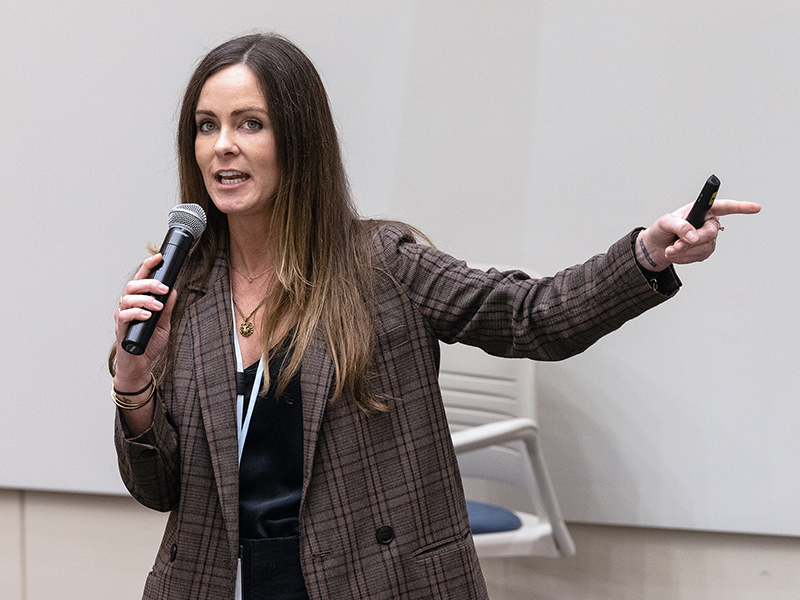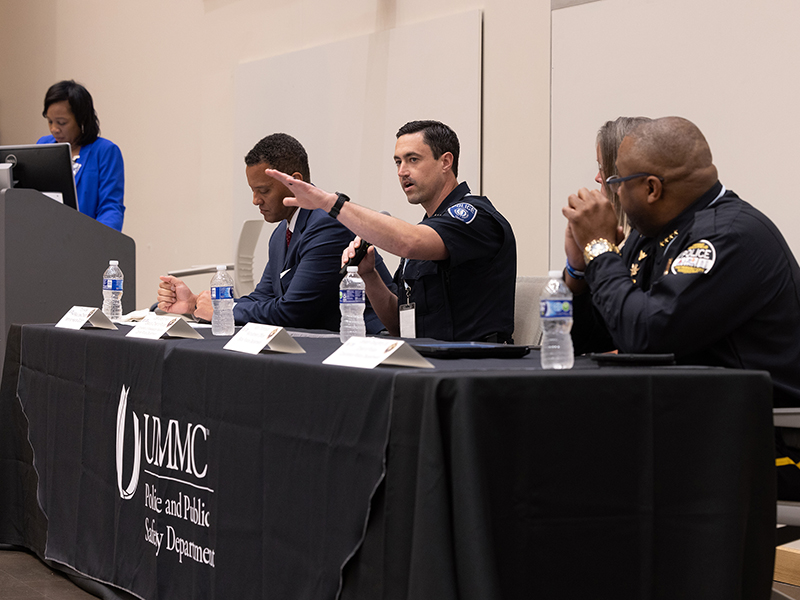Women in law enforcement highlights conference at UMMC

Women in the UMMC Police and Public Safety Department felt like they might as well have arrived from outer space when they began careers in law enforcement.
“I was the only female working two districts in the south side of Chicago,” UMMC Police Chief Mary Paradis said. “That’s a lot of territory in the city. I got to go to every search.”
It was the 1980s, and though “Cagney & Lacey” offered primetime TV viewers a small taste of life on the beat for the title characters, Paradis and other women struggled for acceptance from peers and the public.
“I had to search everybody who was getting arrested who was a female,” she said. “No female lockup in the district that I worked in and no locker room. We got dressed in our cars. Knocked on a door and asked, ‘Ma’am, did you call the police?’ She said, ‘Ewww, I want the man police. I said, ‘You know what? We’re trying something different today. It’s the thing called the lady police.’”

Jenn Krump, a captain with UMMC Police, speaks during a panel discussion at the 30x30 conference hosted by UMMC March 16-17. Also on the panel were Mary Paradis, UMMC chief of police, Salina Walker, assistant special agent in charge with the Department of Agriculture, Jeffery Johns, Delta State University chief of police and Hanna Cook, a seargeant with Gulfport Police Department.
Jenn Krump, a captain with UMMC PD and Clery Act compliance officer and accreditation manager, spent nearly 15 years as a firefighter, paramedic and EMS instructor in California and the Midwest before becoming a cop in Oakland, Calif.
“I got here coming from one male-dominated, living-in-a-frat house situation into law enforcement, in my mid-thirties,” Krump said. “There was 51 of us in the police academy class in Oakland and just six women. Later, when I got to Gulfport with the police department there, there were six women there. There wasn’t a lot of talking to each other.”
Their remarks came during a conference March 16-17 co-organized by UMMC Police, the National Association of Women Law Enforcement Executives and the 30x30 Initiative. The focus of the meeting was hiring and retaining officers. The initiative aims to increase the percentage of women in law enforcement recruit classes to 30 percent by 2030 and champion policies that support the success of qualified women officers throughout their careers.
Currently, women make up about 13 percent of sworn officers and 3 percent of police leadership in the U.S. Major metropolitan areas show the most progress at hiring more women, at about 23 percent of total force, said Maureen McGough, chief of strategic initiatives with 30x30.

Maureen McGough, chief of strategic initiatives with the 30x30 Initiative, speaks during the organization's conference hosted by UMMC March 16-17.
“The smaller your agency, the less likely it is to have a woman officer,” McGough told about 150 law enforcement officers in attendance, from chiefs to support staff. “Of course, we know those smaller agencies make up the vast majority of agencies in this country.”
Paradis touted UMMC PD being the lone law enforcement agency in Mississippi to sign on to the initiative, which lists more than 250 agencies nationwide as having done so.
“We signed on to the initiative on March 17, 2022, and I’m proud to report one year later 37 percent of my sworn law enforcement officers are females,” she said.
An ongoing challenge to keep women interested in furthering law enforcement careers is fostering a spirit of cooperation instead of pure competition, Krump said, mirroring the personal stories of women who appeared on the panel.
“One of the biggest problems we have in the fire service and law enforcement is we feel like, ‘I’ve reached it this far and I’m not going to bring somebody with me,’” she said. “Because maybe we didn’t get that opportunity.”
Panel discussions at the two-day event inside the School of Medicine covered overcoming barriers women still face in law enforcement careers, such as health and child care policies, perspectives from male chiefs who have made strides toward more inclusive hiring and the state of policing in Mississippi.

UMMC Deputy Police Chief Joshua Bromen speaks at the 30x30 Initiative conference hosted by UMMC March 16-17. Also seated are Tony Alves, HR director at Memorial Hospital Gulfport and former Gulfport police officer, left, April Thompson, recruitment officer with Gulfport Police Department and Joseph Daughtry, Columbus chief of police. Moderating the panel is Dr. Juanyce Taylor, UMMC chief diversity and inclusion officer.
“We need to look at other things in the entire structure and how we’re funding both sides of this coin,” said UMMC Deputy Chief of Police Josh Bromen, during panel discussion about the state of policing. He said fire insurance ratings, which drive the ability of fire departments to purchase new pumper trucks, have no equivalent metric for crime ratings to similarly fund police departments.
“It’s not the same,” he said. “What we’re being asked and what we’re asking these men and women to do with no training. It takes more (training) hours in Mississippi to be a barber than it does to be a police officer. That doesn’t make sense.”
Additional guest speakers and/or moderators on the conference’s panels included Kym Craven, executive director of NAWLEE; Columbus (Miss.) Police Chief Joseph Daughtry; Tony Alves, HR director at Memorial Hospital Gulfport (Miss.); April Thompson, recruitment officer, and Sgt. Hanna Cook, both of the Gulfport Police Department; Delta State University Police Chief Jeffery Johns; Salina Walker, assistant special agent in charge with the Department of Agriculture; Dr. Nikki Smith-Kea, executive in residence and Stoneleigh Fellow with the Philadelphia (Pa.) Police Department; Dr. Juanyce Taylor, chief diversity and inclusion officer for UMMC; Jordan McMichael, general counsel for the Mississippi Department of Public Safety; Alison Baker, county court judge in Harrison County (Miss.); Jimmy Perdue, chief of police for the North Richland Hills (Texas) Police Department; John Neal, retired chief of police in Ridgeland; Natalie Lokey, first vice president of NAWLEE and retired deputy chief for the Nashville Metro Police Department; and Christiane Williams of Leading by Example Mississippi.


